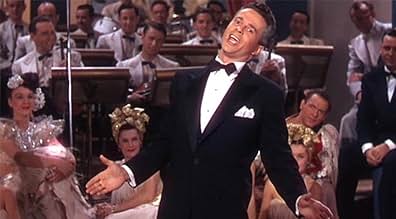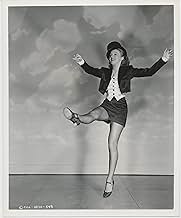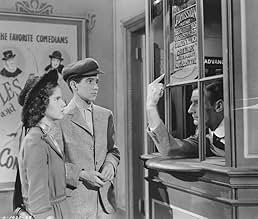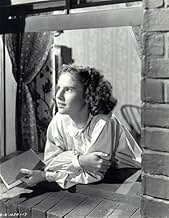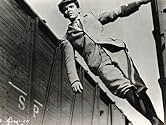IMDb RATING
7.2/10
1.9K
YOUR RATING
This movie shows the idealized career of the singer Al Jolson, a little Jewish boy who goes against the will of his father in order to be in showbiz. He becomes a star, falls in love with a ... Read allThis movie shows the idealized career of the singer Al Jolson, a little Jewish boy who goes against the will of his father in order to be in showbiz. He becomes a star, falls in love with a non-Jewish dancer, and marries her. In the end he chooses success on the stage.This movie shows the idealized career of the singer Al Jolson, a little Jewish boy who goes against the will of his father in order to be in showbiz. He becomes a star, falls in love with a non-Jewish dancer, and marries her. In the end he chooses success on the stage.
- Won 2 Oscars
- 5 wins & 5 nominations total
The Robert Mitchell Boy Choir
- Church Choir
- (as Mitchell 'Boychoir')
John Alban
- Audience Member
- (uncredited)
Rod Alexander
- Dancer
- (uncredited)
Jessie Arnold
- Wardrobe Woman
- (uncredited)
Frank Baker
- Audience Member
- (uncredited)
Steve Benton
- Audience Member
- (uncredited)
Edward Biby
- Audience Member
- (uncredited)
7.21.9K
1
2
3
4
5
6
7
8
9
10
Featured reviews
10clive-38
The most enthralling musical biography of all time - "you ain't heard nothin' yet!"
"The Jolson Story" must be one of the most outstanding musical biographies to ever come out of Hollywood with a multitude of unforgettable popular songs, luxuriant colour photography, and a noteworthy performance by Larry Parks in his most accomplished role as Al Jolson. The stunning Evelyn Keyes sparkled as Julie Benson and the eminent William Demarest was entertainer Steve Martin (later Jolson's manager). "Give that boy a spotlight!!". Ludwig Donath and Tamara Shayne were an inspired choice as Jolson's parents: "Papa, Asa isn't Asa any more!". Bill Goodwin was Jolson's close friend and singer Tom Baron (later theatrical impresario) and talented Scotty Beckett gave an appealing performance playing Jolson as a boy. William Demarest had also appeared with Al Jolson years earlier in "The Jazz Singer" (1927) so it is intriguing to speculate whether they reminisced about that during the production of "The Jolson Story". William Demarest received an Academy Award nomination as Best Supporting Actor for his part in "The Jolson Story" but was beaten by Harold Russell for "The Best Years of Our Lives". Larry Parks was also nominated (as Best Actor) but lost to Fredric March (again for "The Best Years of Our Lives"). As some small consolation the film did win Oscars for the Best Musical Score and the Best Sound Recording. (For some obscure reason it wasn't even nominated for the best picture award much to my surprise).
The film has an absorbing storyline even though it is not entirely accurate and it does take some liberties with the facts. Jolson's mother died when he was eight years old yet in the film she lives on to see him become a big success on Broadway. Many people who played active parts in Jolson's real life story did not even get a mention in the film version. His long time manager Louis Epstein, his dresser/valet Frank Holmes and his brother Harry were all eliminated from the plot! The character Steve Martin played by William Demarest did not actually exist and it has been suggested that this role was probably a composite of the three men referred to above plus several other people. Jolson's first two wives were not even mentioned and Ruby Keeler (Jolson's third wife) would not allow her name to be used in the picture so ravishing Evelyn Keyes had to play the fictitious Julie Benson instead. Ziegfeld: "This is Julie Benson - the star of my next production "Show Girl"." Jolson: "Mr Ziegfeld you will please not advertise on my time!".
Harry Cohn (the notorious head of Columbia Pictures) is to be congratulated for going ahead with this film when all the other major studios had turned it down. Even Warner Bros. (for whom Jolson had starred in several films) were not interested. Filming was started on a small budget and in black and white. However, when Harry Cohn saw the early rushes he decided to film in colour and make "The Jolson Story" a major prestigious production. This certainly paid off for him in a big way as the film became one of Columbia Pictures top money earners. Jolson desperately wanted to play the leading role himself and was opposed to another actor portraying his life. Unfortunately at that stage in his career he was obviously too old (he was 60) but the studio could not have found anyone better than the young Larry Parks (31) who perfectly captured the Jolson style and threw himself into the part with relish. However, Jolson did manage to play himself in one scene singing "Swanee" on the Winter Garden runway (all filmed in longshot with no close-ups). When I saw "The Jolson Story" for the first time it had a major impact on my life and for weeks afterwards I was quoting lines from the film that had stuck in my mind such as these from Jolson to Julie Benson: "Broadway, ha, what a street, you know something baby - it belongs to me. You know something else, if you want it, I'll give it to you!"
The musical numbers were absolutely magnificent and with popular songs like "California Here I Come", "You Made Me Love You", "Toot Toot Tootsie", "April Showers", "Robert E. Lee", "Liza", "Mammy", "Liza", "About a Quarter to Nine", "I'm Sitting on Top of the World" and "Rockabye Your Baby" how could it miss! If there is one film I could take to a desert island it would have to be "The Jolson Story" as I never tire of seeing repeated showings of this timeless classic. As Jolson himself would have said: "Settle back folks, you ain't heard nothin' yet!" (and he would be right about that). 10/10. Clive Roberts.
The film has an absorbing storyline even though it is not entirely accurate and it does take some liberties with the facts. Jolson's mother died when he was eight years old yet in the film she lives on to see him become a big success on Broadway. Many people who played active parts in Jolson's real life story did not even get a mention in the film version. His long time manager Louis Epstein, his dresser/valet Frank Holmes and his brother Harry were all eliminated from the plot! The character Steve Martin played by William Demarest did not actually exist and it has been suggested that this role was probably a composite of the three men referred to above plus several other people. Jolson's first two wives were not even mentioned and Ruby Keeler (Jolson's third wife) would not allow her name to be used in the picture so ravishing Evelyn Keyes had to play the fictitious Julie Benson instead. Ziegfeld: "This is Julie Benson - the star of my next production "Show Girl"." Jolson: "Mr Ziegfeld you will please not advertise on my time!".
Harry Cohn (the notorious head of Columbia Pictures) is to be congratulated for going ahead with this film when all the other major studios had turned it down. Even Warner Bros. (for whom Jolson had starred in several films) were not interested. Filming was started on a small budget and in black and white. However, when Harry Cohn saw the early rushes he decided to film in colour and make "The Jolson Story" a major prestigious production. This certainly paid off for him in a big way as the film became one of Columbia Pictures top money earners. Jolson desperately wanted to play the leading role himself and was opposed to another actor portraying his life. Unfortunately at that stage in his career he was obviously too old (he was 60) but the studio could not have found anyone better than the young Larry Parks (31) who perfectly captured the Jolson style and threw himself into the part with relish. However, Jolson did manage to play himself in one scene singing "Swanee" on the Winter Garden runway (all filmed in longshot with no close-ups). When I saw "The Jolson Story" for the first time it had a major impact on my life and for weeks afterwards I was quoting lines from the film that had stuck in my mind such as these from Jolson to Julie Benson: "Broadway, ha, what a street, you know something baby - it belongs to me. You know something else, if you want it, I'll give it to you!"
The musical numbers were absolutely magnificent and with popular songs like "California Here I Come", "You Made Me Love You", "Toot Toot Tootsie", "April Showers", "Robert E. Lee", "Liza", "Mammy", "Liza", "About a Quarter to Nine", "I'm Sitting on Top of the World" and "Rockabye Your Baby" how could it miss! If there is one film I could take to a desert island it would have to be "The Jolson Story" as I never tire of seeing repeated showings of this timeless classic. As Jolson himself would have said: "Settle back folks, you ain't heard nothin' yet!" (and he would be right about that). 10/10. Clive Roberts.
Enjoyable!
I was 20years old when this film came out, and Jolson voice was so well known even before, that it was such a big thrill to see his biography on film. Larry Parks was typecast from the very beginning, playing Al Jolson. He was a fine actor but got involved with communism politics of the McCarthy Hearings and was dropped by the studios in 1950. Evelyn Keyes (of Gone With the Wind fame) plays Mrs Jolson, and William Demarest plays Jolson's mentor. Ludwig Donath plays his father the Cantor while Tamara Shayne plays his mother. His father wanted him to be a cantor, but Jolson wanted to sing on stage, so he runs away at an early age. He takes up with a fidler on the stage played by William Demarest. It is true that Jolson was such an egotist and loved singing so much that it broke up his marriage. Wonderful scoring of the music, and photography is enchanting. If you like the old songs, especially Jolson's, don't miss it! 8/10
The Greatest.
"Let me sing a funny song, with crazy words that roll along, and if my song can make you happy, I'm happy.....I'm happy....." Al Jolson sang those words of the song, ' Let me sing and I'm happy,' in the opening of The Jolson Story, words that epitomized the passion and energy in his music. The Jolson Story does a magnificent job in giving us a taste of Jolson's magic that spellbound America in the twenties and early thirties, most of his songs are in the show, April Showers, Swanee, Mammy, California Here I Come and , the incomparable, The Anniversary Song, sang as only Jolson can. And, due to some enterprising technology at the time we also hear more of his voice in the Movie that perhaps his fans did in those days with Film Studio microphones capturing and accentuating a deep resonance that is solely Jolson's. The Film doesn't attempt to factually explore his life, although we do get a chance to see some truths of the relationship with his real life wife, Ruby Keeler, who in the Movie was known as Julie Benson, played by Evelyn Keys. Interesting to note was the fact that Columbia Pictures, who released the Movie failed to give Warner Bros.the Film company responsible for giving Jolson the role in The Jazz Singer, any recognition whatsoever, presenting further evidence of the Producer's and Jolson's desire to give us some entertainment, as opposed to a lesson in history. And, entertained we are, as Larry Parks, with his unbelievable miming to Jolson's songs......apart from a cameo from Jolson singing Swanee....takes us from Vaudeville days in the twenties with all Jolson's great songs and routines, to his semi retirement in the thirties. The Jolson Story is a wonderful experience, full of songs we still sing today more than fifty years after they were released, and sung by the man most of us remember as the greatest entertainer of them all......Al Jolson.
THE Magical Musical of All-Time.
After all these years, and all my countless viewings, "The Jolson Story" remains the most magical and thrilling of all Hollywood musical biographies. It also stands as testament to "The World's Greatest Entertainer," Al Jolson, and his tremendous impact on show business for all time. Jolie's fantastic voice, filled with warmth, power and soul, will always be heard as long as this wonderful movie is viewed. Larry Parks and his supporting cast are superb, but it is that Jolson voice, electricity-personified, that elevates the film to immortal status.
a corny old musical that works its magic after all these years
I have just watched the Jolson story on dvd and it is great, the music is fresh and the technicolor is fantastic.The story is loosely based on Jolsons life, though I think if your after a serious study of his career you should visit your libary and read up on his life.The acting is top notch, William Demarest is excellent as the Steve Martin a mentor to Jolson as he grows up then a manager of his career.I also like the performances of mama and the kantor.The Julie Benson charactor is supposed to be Ruby Keeler, they are the perfect couple but show business is the drug that Al Jolson is addicted to, and that eats into their relationship.The energy of this movie is tremendous it stays with you for hours the melodys linger in your head, its life affirming.The beauty of this dvd is that the sequel is also on the dvd so I will be watching that soon.Marks out of ten /9.5
Did you know
- GoofsThe Jazz Singer (1927) had its world premiere at the Warner Theatre in New York, not the Winter Garden as depicted in the film (as "The Jolson Story" was a Columbia picture, the change is understandable).
- ConnectionsFeatured in The Soundman (1950)
- SoundtracksLet Me Sing and I'm Happy
(uncredited)
Written by Irving Berlin
Sung by Al Jolson over opening credits
Originally from Mammy (1930)
- How long is The Jolson Story?Powered by Alexa
Details
- Release date
- Country of origin
- Language
- Also known as
- Der Jazzsänger
- Production company
- See more company credits at IMDbPro
Box office
- Budget
- $2,800,000 (estimated)
- Runtime
- 2h 8m(128 min)
- Aspect ratio
- 1.37 : 1
Contribute to this page
Suggest an edit or add missing content

